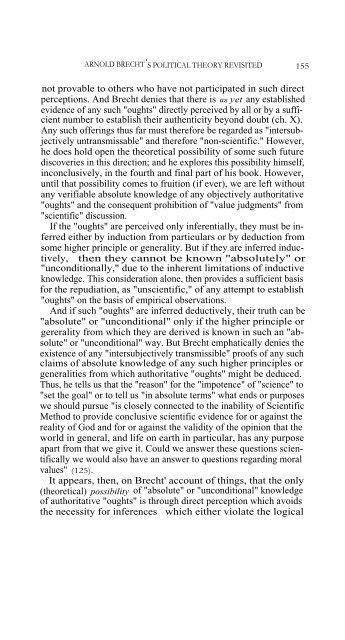ARNOLD BRECHT'S POLITICAL THEORY REVISITED Political ...
ARNOLD BRECHT'S POLITICAL THEORY REVISITED Political ...
ARNOLD BRECHT'S POLITICAL THEORY REVISITED Political ...
You also want an ePaper? Increase the reach of your titles
YUMPU automatically turns print PDFs into web optimized ePapers that Google loves.
<strong>ARNOLD</strong> BRECHT ' S <strong>POLITICAL</strong> <strong>THEORY</strong> <strong>REVISITED</strong> 155<br />
not provable to others who have not participated in such direct<br />
perceptions. And Brecht denies that there is as yet any established<br />
evidence of any such "oughts" directly perceived by all or by a sufficient<br />
number to establish their authenticity beyond doubt (ch. X).<br />
Any such offerings thus far must therefore be regarded as "intersubjectively<br />
untransmissable" and therefore "non-scientific." However,<br />
he does hold open the theoretical possibility of some such future<br />
discoveries in this direction; and he explores this possibility himself,<br />
inconclusively, in the fourth and final part of his book. However,<br />
until that possibility comes to fruition (if ever), we are left without<br />
any verifiable absolute knowledge of any objectively authoritative<br />
"oughts" and the consequent prohibition of "value judgments" from<br />
"scientific" discussion.<br />
If the "oughts" are perceived only inferentially, they must be inferred<br />
either by induction from particulars or by deduction from<br />
some higher principle or generality. But if they are inferred inductively,<br />
then they cannot be known "absolutely" or<br />
"unconditionally," due to the inherent limitations of inductive<br />
knowledge. This consideration alone, then provides a sufficient basis<br />
for the repudiation, as "unscientific," of any attempt to establish<br />
"oughts" on the basis of empirical observations.<br />
And if such "oughts" are inferred deductively, their truth can be<br />
"absolute" or "unconditional" only if the higher principle or<br />
gererality from which they are derived is known in such an "absolute"<br />
or "unconditional" way. But Brecht emphatically denies the<br />
existence of any "intersubjectively transmissible" proofs of any such<br />
claims of absolute knowledge of any such higher principles or<br />
generalities from which authoritative "oughts" might be deduced.<br />
Thus, he tells us that the "reason" for the "impotence" of "science" to<br />
"set the goal" or to tell us "in absolute terms" what ends or purposes<br />
we should pursue "is closely connected to the inability of Scientific<br />
Method to provide conclusive scientific evidence for or against the<br />
reality of God and for or against the validity of the opinion that the<br />
world in general, and life on earth in particular, has any purpose<br />
apart from that we give it. Could we answer these questions scientifically<br />
we would also have an answer to questions regarding moral<br />
values" (125).<br />
It appears, then, on Brecht' account of things, that the only<br />
(theoretical) possibility of "absolute" or "unconditional" knowledge<br />
of authoritative "oughts" is through direct perception which avoids<br />
the necessity for inferences which either violate the logical
















